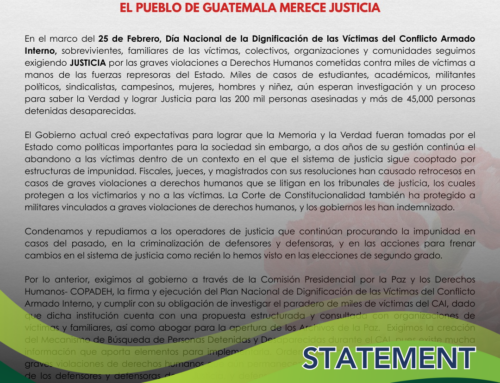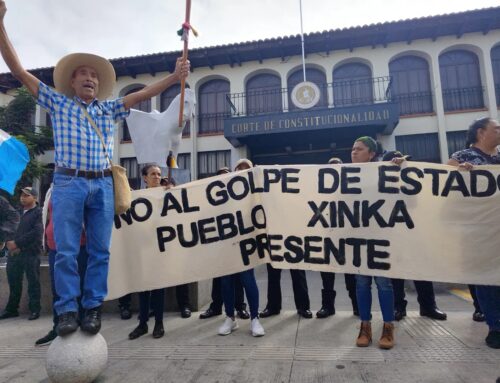On June 22, 2015, Judge Miguel Ángel Gálvez ruled to accept witness testimonies and other evidence in the Sepur Zarco sexual slavery case. This is the first case of its kind to be heard in Guatemala courts and will be presided over by Judge Yassmín Barrios. The case first began in September 2011, when the Breaking the Silence and Impunity Alliance
[1] filed a legal complaint against former military personnel on charges of sexual violence committed against the Q’eqchi’ women at the Sepur Zarco military base during the internal armed conflict. Although no firm trial date is set, it is expected to begin early next year.
In 1982, the military arrived in Sepur Zarco in eastern Guatemala and accused the Q’eqchí community of forming part of the guerilla. The nearby military base, used as a rest and recreation center for soldiers, was operating within a larger context of illegal land grabs. The center had the support of powerful national and international economic interests who were using large areas of land in the area to produce sugar cane for biofuels and carry out other resource extraction activities.
During the preliminary phase of the trial, 15 women testified to having been enslaved and repeatedly raped by soldiers – sometimes in front of their children – between 1982 and 1988. During these years, they were also forced to cook for the soldiers and wash their clothes. Many of the women were held hostage at the base for at least 6 months in 1982 after their husbands had been disappeared.
Former Colonel Esteelmer Francisco Reyes Girón and former Military Commissioner Heriberto Valdéz Asig were arrested and indicted in 2014, Reyes Girón is being charged with crimes against humanity, including sexual violence, sexual slavery, domestic slavery, cruel and inhumane treatment, and murder. Valdéz Asig is also being accused of crimes against humanity, including sexual violence and forced disappearance.
For more information on the Sepur Zarco case, read an article written by a Luz Mendez, a leader with UNAMG, and an interview with Gabriela Rivera, a lawyer with Mujeres Transformando el Mundo.
| A survivor testifies in 2012 with the support of an interpreter. Photo credit: CPR Urbana |
This case of sexual slavery has opened the door for other cases of sexual violence committed during the armed conflict to be heard – including during the 2013 genocide trial – and has set the stage for the inclusion of the systematic use of sexual violence by the military as considered a war crime. According to the Historical Clarification Commission, 88.7% of the sexual violence committed during the armed conflict was against indigenous women.
Judge Barrios presided over the historic 2013 genocide case that convicted former general Efraín Ríos Montt of genocide and crimes against humanity. Ever since the Constitutional Court overturned the verdict ten days later in a controversial ruling, Judge Barrios has had to fight her own legal battles against economic and military interests that continue to hold power in Guatemala. Shortly after emitting the sentence, Guatemala’s Bar Association imposed sanctions on her and attempted to have her suspended from the bench . Later, the Constitutional Court unanimously rejected the sanctions, citing the Bar’s actions to impose sanctions on Barrios as an “improper intrusion on judicial independence.”
The Public Prosecutor and plaintiffs for this case have already denounced the stalling tactics being employed by the defense in this case as an attempt to evade justice. In the coming months, it will continue to be important to hold the international spotlight on this precedent-setting case. Through ACOGUATE, NISGUA has accompanied the Sepur Zarco case since 2012.
[1] The Breaking the Silence and Impunity Alliance is made up of three organizations: Women Transforming the World (Mujeres Transformando el Mundo – MTM), the Community Studies and Psychosocial Action Team (Equipo de Estudios Comunitarios y Acción Psicosocial – ECAP) and the National Union of Guatemalan Women (la Unión Nacional de las Mujeres Guatemaltecas – UNAMG).






Leave A Comment